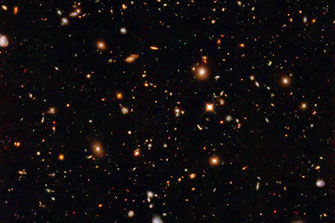The Fine-Tuning Argument
The classic Design Argument points to ways that the universe seems to be designed that are readily observable in common experience. Creatures are extremely well-suited for their habitats, and the planets move in regular fashion, like clockwork. In recent decades, a new design argument has been developed that relies on extremely technical evidence from contemporary physics. This argument raises the possibility that scientific discoveries provide evidence for the existence of God. This is interesting since people sometimes think that science is antithetical to belief in God. However, it is also problematic since almost all philosophers who write about the Fine-Tuning Argument do not have the scientific expertise required truly to understand the technical evidence from physics. (This includes me.) The best most of us can do is to try to figure out what most scientists think, and trust that.
What philosophers who endorse the Fine-Tuning Argument say that scientists say is: the universe seems to be fine-tuned for life. What this means is that (1) the values of a number of physical constants -- the gravitational constant, strong and weak nuclear forces, etc. -- are in the range required for there to be life, (2) this range is extremely narrow, and (3) there is no reason the constants had to have the values they have. (1) is old news. (2) and (3) are new news, and are supposed to fuel the Fine-Tuning Argument.
If these constants were different from their given values, the universe would not be capable of supporting life. For example, say that the gravitational constant were significantly larger. Then the Big Bang would be quickly followed by the collapse of the universe, and there would be no time for stars to form or life to develop. Now say that the gravitational constant was significantly smaller. Then no galaxies or stars would have formed, and the Big Bang would have been followed in relatively short order by the heat death of the universe.
There are many physical constants that have to be balanced with the right values. It's a balancing act in very many dimensions. To get a sense of the scale of it, let's reduce it to two. Suppose we had a one square inch pillar and a thin, extremely rigid titanium sheet with exactly one balancing point. We divide the titanium sheet into one inch square sections and number them. We then randomly select a number and put the pillar on that section. Obviously, the bigger the sheet, the less likely the balancing point will be selected.
There are a wide range of estimates from physicists on the improbability of a randomly generated universe having the physical constants to support life. The low end of this range is around 1 in 10^60. These are the odds that a randomly generated one-inch square is the balancing point for a titanium sheet the size of Australia.

Now that's an idealized titanium sheet!
It seems absurd to think that a balancing act this improbable would happen by chance.

Strangely, the fate of the typical randomly generated universe would be much like many of our fates in this universe.
The Fine-Tuning Argument claims it is much, much, much more likely that a life-supporting universe was created by an intelligent designer than that it is the result of random chance. Therefore, we should believe that the universe has an intelligent designer. The best illustration of this reasoning that I know of is due to Bradley Monton. Monton asks us to imagine a dart coming out of an enclosed booth and hitting a dartboard. There is a 50% chance that there is an expert darts player in the booth who always hits bullseyes, and a 50% chance there is a random dart-throwing machine in the booth that is equally likely to hit an area of the board. We see a dart come out and hit the bullseye. We should now be much more confident that there is an expert in the booth than the machine.
The analogy works like this:
- The dart hitting the bullseye represents the universe's being capable of supporting life.
- The random dart-throwing machine represents the universe's being created randomly.
- The expert darts player represents an intelligent designer.
When we see the dart hit the bullseye, we should think it is more likely that the expert is in the booth. Similarly, when we see a life-supporting universe, we should think it is more likely that it was created by an intelligent designer.
Is this intelligent designer God? The Design Argument had problems inferring that God exists from the claim that the universe was designed. The Fine-Tuning Argument inherits these issues. It must answer all of Hume's criticisms of the second part of the Design Argument. Still, it is an improvement over the standard Design Argument because it defends a more precise sense in which the universe appears to be designed.
Copyright 2019 by Sam Ruhmkorff
